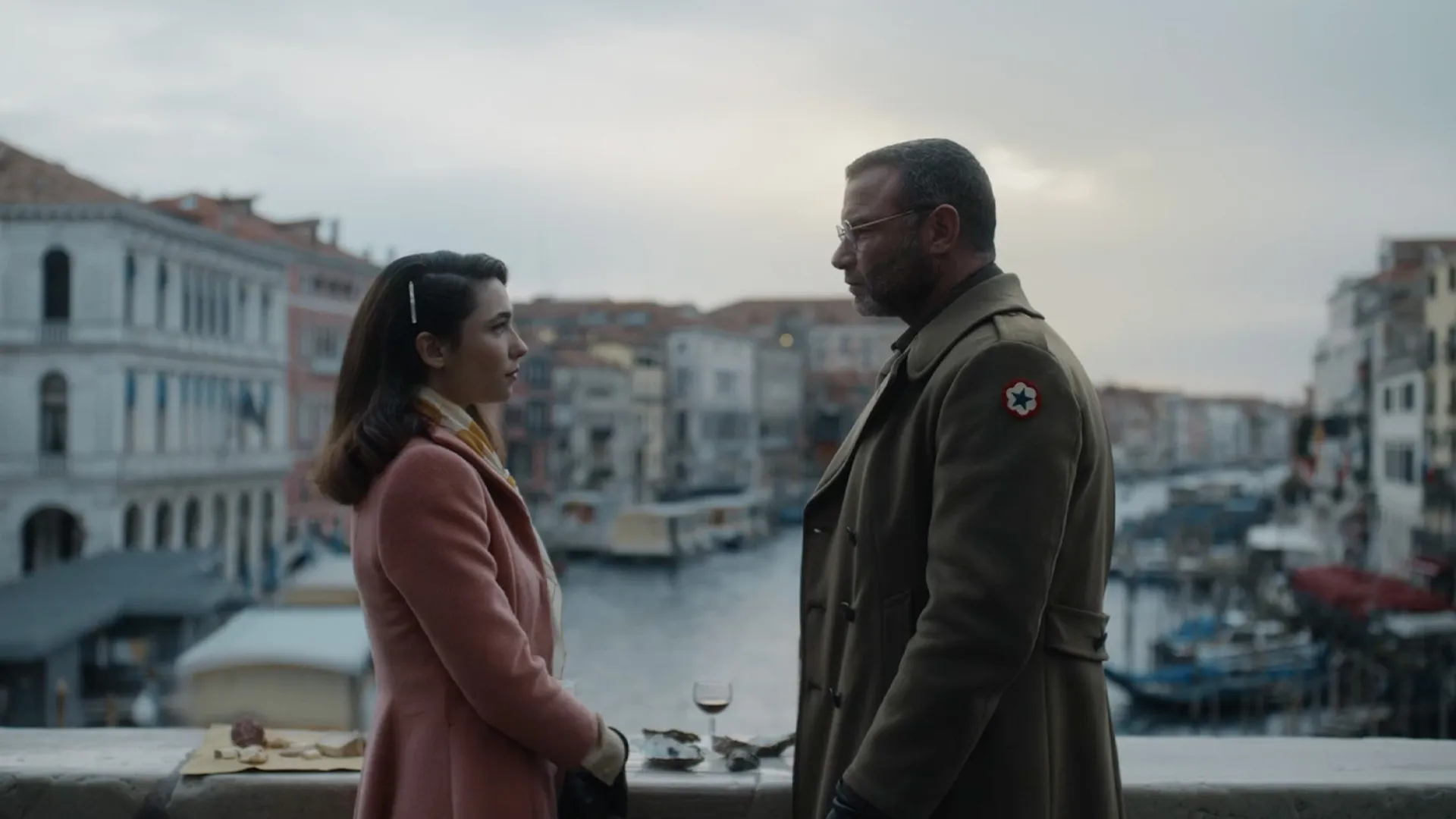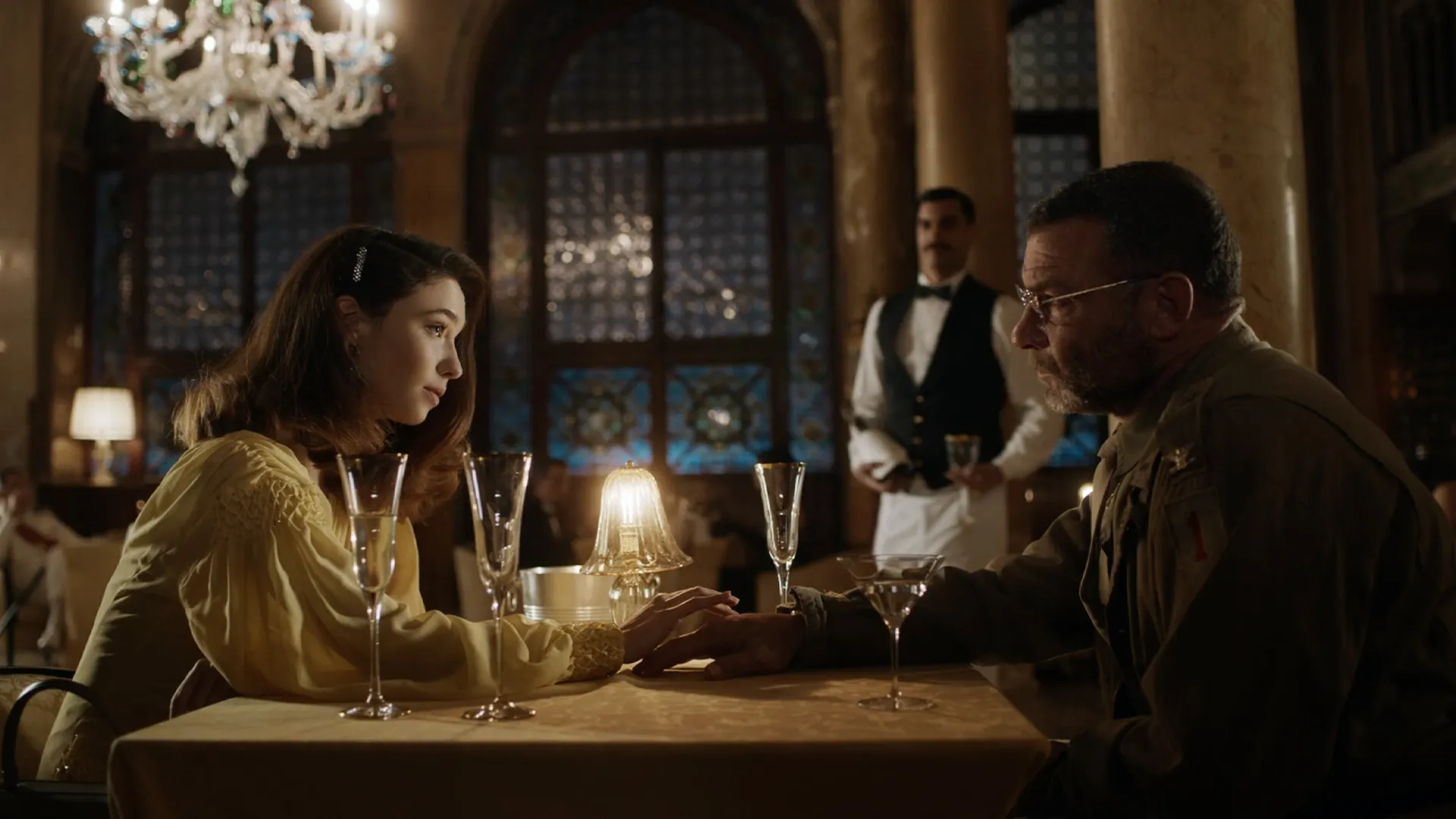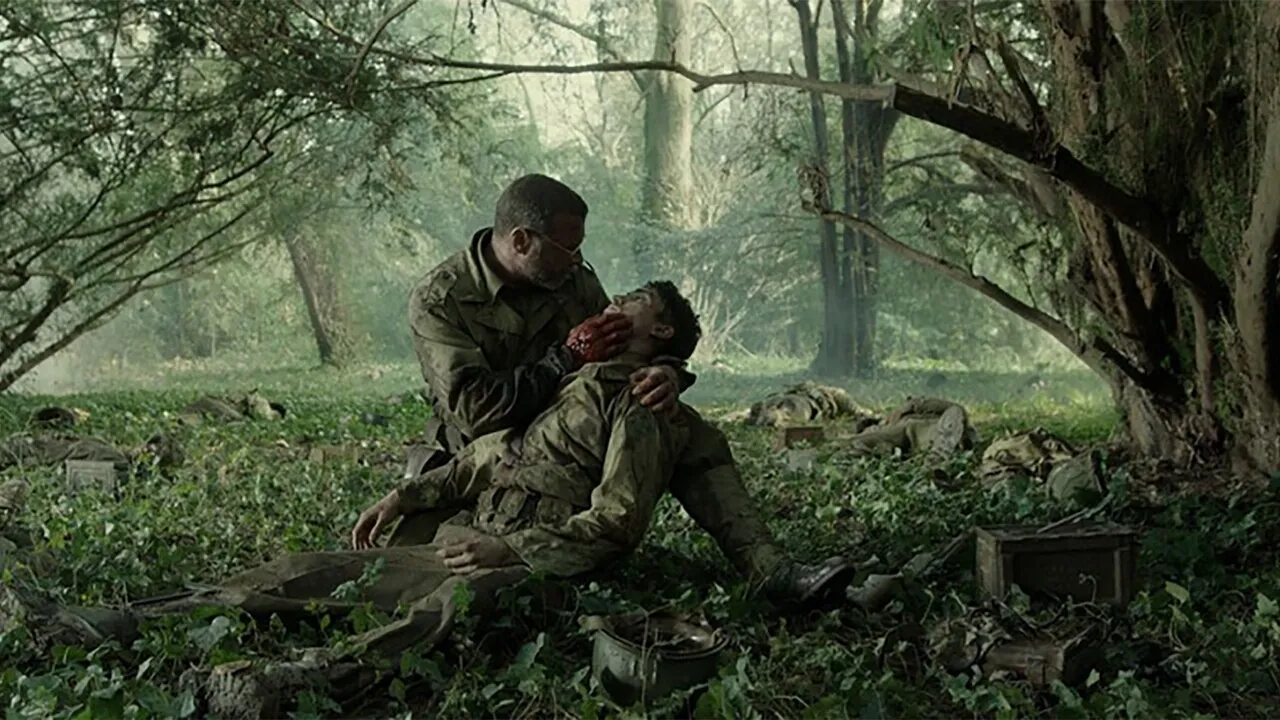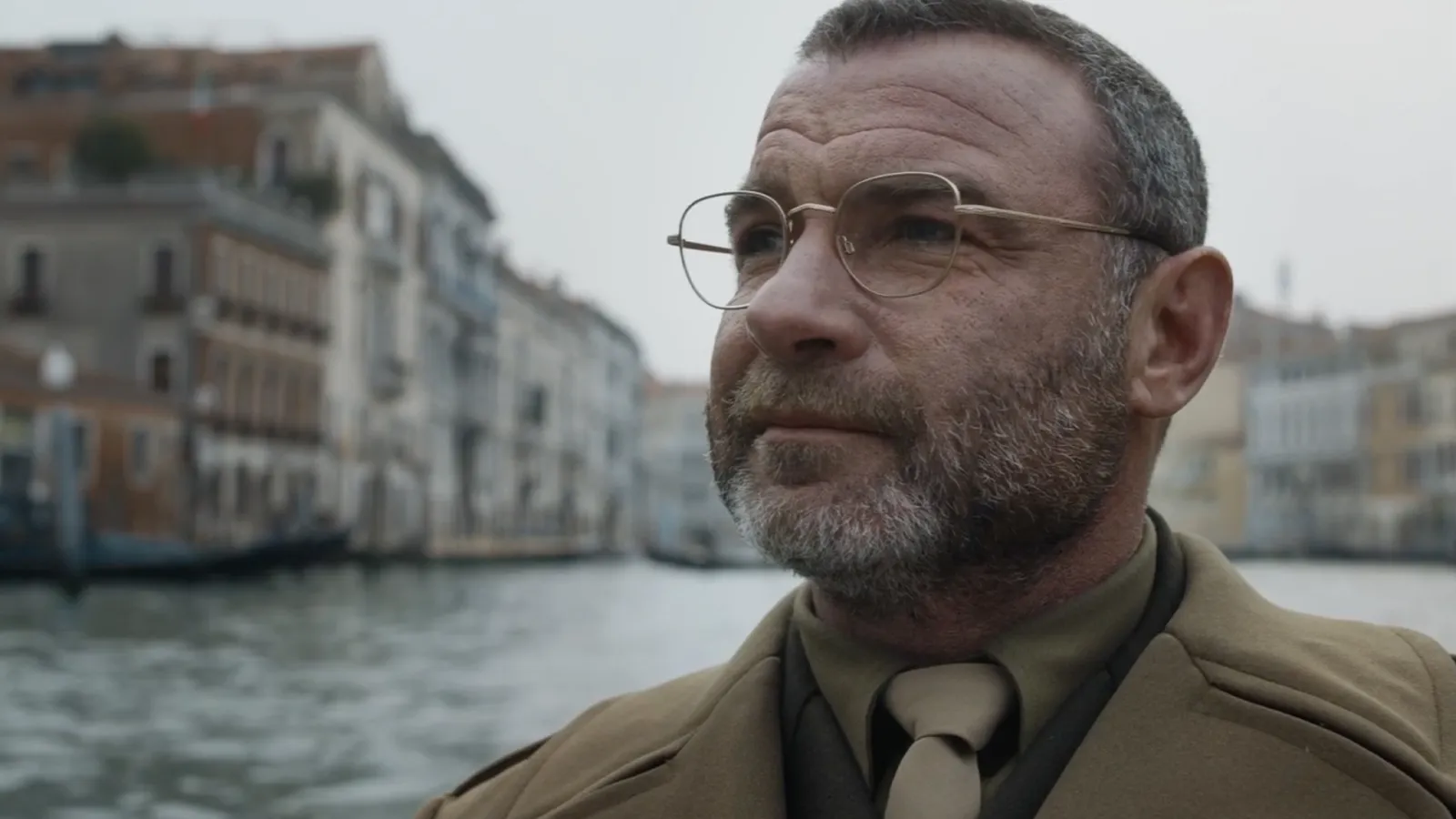Ernest Hemingway’s 1950 novel Across the River and Into the Trees has long seemed an unlikely candidate for the silver screen. The story delves deep into existential themes that are challenging to portray visually. Yet the latest film adaptation, directed by Paula Ortiz, proves just how moving a meditation on life, death, and human connection it can be.
At the center are two complex characters. Richard Cantwell is a weary American colonel, already haunted by his actions in two world wars. After learning his heart will soon give out, he makes one last journey to find solace in Venice. There he meets Renata, a young Italian woman facing her own crossroads. On the surface, they seem from different worlds. But in quiet, poignant moments together, they gain deeper understanding.
Liev Schreiber and Matilda De Angelis bring intense depth to these roles. Schreiber especially captures the vulnerability beneath Cantwell’s outer shell. The dynamic between them drives the film, as conversations explore big ideas about life’s fleeting moments.
Director Ortiz frames their interactions with dreamlike care, letting the backgrounds of Venice enrich subtle themes. She also shines a light on Hemingway’s darkness, unafraid to delve beneath romances surface to reveal the universal human search for meaning.
While criticisms of simplification exist, this adaptation proves Hemingway’s tale transfers surprisingly well to the screen. For those open to getting lost in its atmosphere, Across the River and Into the Trees offers tender lessons about living fully in spite of inevitable change. Most importantly, it gives new life to characters who will long linger in the mind.
The Final Journey
Colonel Richard Cantwell’s story begins with a medical diagnosis he isn’t ready to hear. After decades of military service, including two World Wars, his body is finally giving out—a failing heart will soon end his life. Despite this ominous prognosis, Cantwell refuses to slow down just yet. He arranges one last mission: a trip to Venice, the city holding both beauty and tragedy in its canals.
Accompanied only by his reluctant driver, Sergeant Jackson, Cantwell arrives in Venice with one thing on his mind—a hunting trip that feels more like an excuse. But fate has other plans in store. Wandering the city streets, he encounters Renata, a young countess whose family faces hardship. Drawn to her spirit, a friendship blossoms between these two souls, each seeking solace.
Over the film’s three-day timeline, Cantwell and Renata spend long hours lost in conversation. She shows him her Venice in quiet moments away from obligations as he opens up about his past. Through them, we glimpse a passionate yet fleeting romance forbidden by their differences in age and status. All the while, Cantwell’s health steadily declines as his final days approach.
Directed by Paula Ortiz, this adaptation streamlines some aspects for modern viewers. Gone are nonlinear flashbacks, replaced by a clear chronology highlighting their time together. While condensing themes, it retains the atmosphere and emotional depth that made Hemingway’s original novel a classic. In spending these intimate hours with unforgettable characters, we become privy to their profound journey towards acceptance of life’s bittersweet realities.
The Stars of Venice
At the heart of Across the River and Into the Trees are two remarkable performances that will leave a lasting impact. Liev Schreiber, as the weary Colonel Cantwell, delivers a deeply moving portrayal, bringing equal amounts of vulnerability and strength to the role.
You feel Cantwell’s weariness in his eyes—the heavy weight of wars fought, lives lost, and love found then torn away. Yet there remains kindness. Schreiber ensures we view this man with empathy, not judgment. His subtle expressions speak volumes during intimate scenes.
It’s a masterful portrayal that deserves recognition among Schreiber’s finest works. He inhabits Hemingway’s character fully while making the role his own. Opposite Schreiber is the radiant Matilda De Angelis as Renata.
De Angelis imbues her character with spirited charm and carefree joy, yet also a hint of sadness behind the smile. She shares incredible on-screen chemistry with Schreiber. During their walks through Venice, your own heart joins theirs dancing.
Then, in soft words and gestures, De Angelis brings piercing tenderness to Renata and Richard’s bond. It’s to her credit that such a complex relationship remains so deeply moving.
Supporting roles showcase more strong work. Josh Hutcherson lends warmth as Sergeant Jackson. Though underwritten, Hutcherson ensures his character’s honesty and care for Cantwell come through.
Laura Morante also leaves an impression with her elegant portrayal of Contessa Contarini, a mother protective yet willing to let her daughter find her way. Acclaimed director Ortiz deserves credit for bringing out the very best in each performer to immerse us fully in their journey.
Guiding Eyes Through Venice
Under Paula Ortiz’s deft hand, Across the River and Into the Trees comes alive as a visual dream. She shapes each moment to draw us deeper into the internal journeys of Cantwell and Renata. Whether during charged dialogue or tender glances, Ortiz’s direction maintains an atmospheric magic.
Noticing the subtlest emotion, she allows vulnerable truths to surface through expressive acting. In lesser hands, scenes of reflection could bore, but Ortiz engages us fully with her characters. Beautifully framed by Javier Aguirresarobe, Venice also takes on character.
Canals flow like memory; decorated bridges evoke transition. Shuttered windows hint at private pains; piazzas buzz with fleeting intimacy. Day and night develop unique textures as our heroes wander. This is a city awakening old ghosts, offering fleeting joy, just as vivid as in life.
Venice embraces them as they face what’s to come. Aguirresarobe gifts every corner with visual poetry. Dimly-lit paths illuminate new connections between Richard and Renata, while radiant mornings bathe their parting in loveliness.
Whether capturing unspoken sorrow in Schreiber’s eyes or liveliness in De Angelis’ smile, he translates emotional complexity. Visuals deepen understanding of their bond’s fragility. Through Ortiz and Aguirresarobe’s artistry, we truly see the songs in these enduring characters’ hearts.
Their collaboration ensures Hemingway’s tales of people amid change resonate timely. In transporting us so fully into its world, this adaptation proves how visual storytelling can deepen insight into human nature. Ortiz guides eyes and minds to cherish life’s fleeting beauty through these windows into an enduring love story.
Reflections in Venice
Some themes truly stand the test of time. Across the River and Into the Trees searches for meaning in facing life’s hardest truths—loss, regret, our fleeting time in this world.
Richard Cantwell knows his days are numbered yet remains torn by things left unsaid. Seeking peace, he returns to Venice holding both beauty and grief. The city seems an old friend, mirroring his own journey towards acceptance.
His boat rides with Renata become symbolic, floating between reality and dreams of futures denied. On land, their talks wander Venice’s pathways, much as memory drifts through the past.
In the contrasting figures of Cantwell and Renata, we find mirrored reflection. She brings levity to his weariness with youthful passion. Yet behind her smile lie family duties not of her choosing.
Their bond hints that in others, we sometimes glimpse parts of ourselves. Facing life’s fragility, two souls from different worlds unite in deep understanding, however briefly. Perhaps in such connections lies comfort, when all else is stripped away.
Across the River and Into the Trees leaves lingering questions, as life’s complexities often do. But through its characters’ search for solace, the film whispers timeless truths. By living fully despite uncertainty and finding empathy even with those who are unlike us, moments can be made beautiful.
Translating Hemingway to Screen
While adaptations require adjustments, Paula Ortiz’s Across the River and Into the Trees proves a novel’s spirit can remain intact on film. Altering aspects like flashbacks in favor of linear storytelling, some wondered if the original’s depth may be lost.
Yet Ortiz understands the heart of Hemingway’s tale lies not in surface details alone. By focusing on the profound themes of reckoning with mortality and longing for connection, she captivates with his characters’ internal journeys.
Sanitizing the intimacy between Richard and Renata for modern audiences is a pragmatic choice. Their chemistry feels no less powerful, even as logistics shift. More importantly, Ortiz ensures their bond’s profundity as a symbol resonates strongly.
At its core, Hemingway’s story delivers a sober message: in facing life’s brevity, finding little moments of compassion helps make darkness bearable. Though simplifying plot, Ortiz’s visual poetry translates the piece’s moving contemplations on humanity to screens.
Her Venice becomes another character with secrets to share if we pay attention. The film understands adaptation requires reinventing a work, not replication. In Schreiber and De Angelis’ performances, Hemingway’s sobering conclusion finds new life, stirring viewers today as it did years ago.
Some details differ, yet the essence remains—a testament to Ortiz honoring the material’s melancholic soul above recreating surface particulars. In the end, this is a translation worthy of the novel it strives to bring anew to audiences.
Passing Shadows
Across the River and Into the Trees proves a story’s heart can live on through new artistry, even after decades. While its tale of mortality and connection surely resonated in Hemingway’s time, Paula Ortiz’s skilled adaptation shows these eternal themes remain deeply moving.
Through Ortiz’s dreamlike lens and outstanding lead performances from Liev Schreiber and Matilda De Angelis, two souls facing life’s fragility come to vibrant life. Their brief bonding lingers with subtle power, much like Venice’s beauty and Venice’s fading light. It’s a film to get quietly lost within, just as the characters lose themselves exploring long-hidden truths.
For those open to reveling in sublime details and pondering life’s mysteries, Schreiber gives a performance to be remembered. His Colonel Cantwell is a role that seems destined to outlive fleeting moments and ripple on in minds; it fills with elegiac tenderness. If haunting stories of the human experience appeal, don’t miss this subtle piece of art before its time slips off into shadow too. Some films feel like finding treasure—this one does so with grace.
The Review
Across the River and Into the Trees
Across the River and Into the Trees proves a classic work of literature can find new life on screen, so long as its soul remains intact. Paula Ortiz's elegant adaptation is a poignant meditation on life, loss, and the fleeting moments that can redeem our brief time under the sun. Anchored by Liev Schreiber's magnificent performance, this is a film that will linger long after its ending credits fade.
PROS
- Intimate and evocative direction from Paula Ortiz
- Exceptional lead performances from Liev Schreiber and Matilda De Angelis
- Beautiful cinematography that transports viewers to 1950s Venice
- Retains the atmosphere and core themes of Hemingway's novel
- Thought-provoking exploration of mortality and love against all odds
CONS
- Simplifies some plotlines and character arcs for runtime
- May not please those wanting a strictly faithful adaptation.
- Darker themes are sometimes underplayed.





















































Discussion about this post